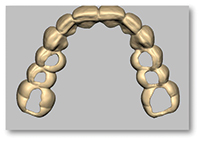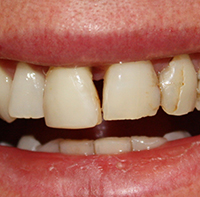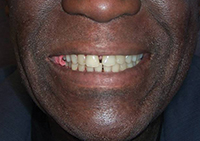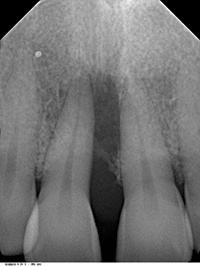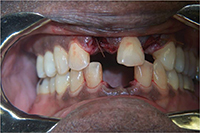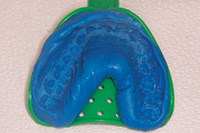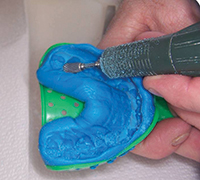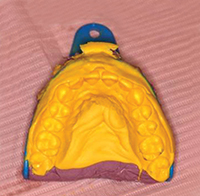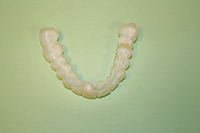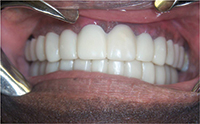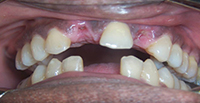For people interested in inventions, or creating technology or software, or starting a company — inventions sometimes sit ‘right under our nose’, and we don’t even know it. M. Marc Liechtung, DDS
It was a spring day in 2008 when I received a call from my father that would forever change my life both professionally and personally. Unsuspecting of anything unusual, I answered only to hear him frantic.
“Could you please head over to your grandmother’s nursing home, her partial was thrown into the incinerator by her roommate who suffers from dementia. Your grandmother is exponentially upset, she has a myriad events to attend and she’s in hysterics over this. Could you please head over there and see if you can do something”?
“Dad, it takes weeks to have another partial made“ I replied, insistent my father asked me again to head over and see what her options were.
Determined to fix this problem I had my head assistant Sylvia — who has been with Manhattan Dental Arts for 28 years, pack me a hand engine, acrylic, impression material, composite and I made his way over to her nursing home in Williamsburg, Brooklyn where I then proceeded to hand craft her a temporary. After a grueling 9 hours I had accomplished my goal and my grandmother was ecstatic.
Nonetheless, the work didn’t stop in Williamsburg. On my drive home my brain was working a mile a minute. Seeing how overjoyed the instantaneity of the hand-crafted temporary made my grandmother, I knew he there had to be a way to gauge the same reaction from people in similar situations. Thus, the idea for the Snap On Smile ® emerged and the search for the perfect material began.
The ideal material was a material that possessed the following properties:
· flexible enough to snap on over existing teeth to secure retention,
· come in various shades or colors
· did not stain
· did not get soft or imbibed with liquids thus enhancing the longevity
· removable by the patient and could appeal as a completely non-invasive appliance which meant no drill or preparations and would not need cement or bonding agents.
Once I found the perfect material — crystalized resin acetyl, the Snap On Smile ® was born and there was no turning back.
From hereon my life exponentially changed, both professionally and personally and this was one of the most exciting aspects of my career. Everyone wanted to know about the Snap On Smile ®; I was asked to speak on several TV shows, such as, The View, CBS Early Show, The Couch and CNN Headline News, just to name a few. Through the Snap On Smile I was able to travel the world and lecture about the Snap On Smile to various dentists and to large groups of practice decision makers and having met a a multitude of influential people along the way.
My career would undergo another metamorphosis when I sold Snap On Smile ® to DenMat (Lumineer) and signed a 2 year contact to lecture for the company around the world. While traveling proved to be enjoyable it was hard to leave behind my family and so I made the decision to focus on my private practice in New York. With the combination of an excellent team and superb teamwork, the practice grew into a multi-million dollar one allowing me the confidence to open 4 more practices that all provided out-of-this-world customer care and quality and outstanding service.
After careful consideration, I decided to sell my practice to a large private-equity-backed Dental Service Organization (DSO) in order to be able to grow the 4 practices I had freshly acquired. As with everything in life, there are positives and negatives associated with selling your practice to a DSO. Positively speaking, the advantages are as follows:
· A DSO tends to price practices slightly higher than the traditional doctor to doctor purchase.
· There is no need for a mortgage contingency which is the status quo in a conventional transaction.
· The selling doctor is able to stay and practice with his original staff which is actually getting more to your practice than the original pay day
· Many things, such as, malpractice insurance bonuses for production and other perks can and should be negotiated with the corporate buyers
· If the doctor owns the real estate, as well as, the practice then this is another added perk upon selling to a corporate entity. The doctor has the chance to have a very strong and every financially stronger opportunity as opposed to a conventional doctor to doctor transaction.
While this sounds nothing short of a positive experience there are also negatives associated with selling to a corporate entity as a dentist. Below are a few reasons why selling to a corporate entity might be negative:
· From a legal perspective, legal fees and the size of the purchase agreement will be so much more arduous than a standard deal. The doctor who is selling will find that they will acquire higher legal fees than any other type of transaction
· Pre-close is a very critical time period for the seller. The DSO or corporate entity will scrutinize the TTY or the Trailing Twelve Months of Revenue. If a doctor does not maintain the numbers between agreement and close, they will recall the deal or conversely, they will change (lower) the purchase price. This is never in favor of the seller.
· Selling to a corporate entity can create several issues post close as well. Large groups tend to impose their own supply orders. This means they will expect the doctor and staff to use different materials and they almost always try and use a less expensive lab. This can create a problem for the selling doctor who has established long term relationships with particular labs, as well as, their sales rep from various vendors. Several things can and should be negotiated prior to the closing
· Another negative that can arise is concerning staff. Although it will like a honeymoon at the beginning, after a period of time the DSO will turn on particular staff members. The fact is that these are long standing staff members that have become family throughout the years. To the corporation it’s a large salary that can be replaced. We as clinicians will have no say whether this happens or not.
In an ironic turn of events, I was approached by the same DSO that I sold my practice to with the offer to buy it back. The corporation was not experienced with running a practice as big as Manhattan Dental Arts and in as diverse a location as the Upper West Side. Once again, I found himself in a position in which the offer was too good to refuse. I bought Manhattan Dental Arts back and have been practicing at the office since August 2018. Although I originally embarked on an entirely different journey I am wholeheartedly excited to continue seeing all of my long-standing patients along with his new patients.
Selling to a DSO or corporate entity is a decision that must be made after much thought and consideration, there are both positives and negatives associated with selling to a corporate entity and it is important to weigh both against each other, but one thing I can say with certainty is that SOS (Snap-On-Smile) and DSO have ultimately been two life-changing acronyms for me.
Manhattan Dental Arts is located on the upper west side of Manhattan. I am available to any young aspiring dentists looking for advice. I am the founder of Manhattan Dental Arts and the Inventor of the Snap-on-Smile®. Manhattan Dental Arts P.C. is located on the Upper West Side at 68th and Broadway. We specialize in dental cleanings,emergency dentistry, dental implants, all-on-4 dental implants, full mouth reconstruction, dental crowns, root canals,periodontics, Snap on Smile, dental bridges, dentures, extractions, smile makeovers and all forms of general and cosmetic dentistry. If you are looking for an emergency dentist in NYC then we offer free consultations. The practice group also owns Kew Gardens Dental Arts, a dental practice in Queens offering dental implants in Queens, emergency dentistry in Queens, teeth cleaning in Queens, dental crowns, dental bridges and all forms of cosmetic and general dentistry. If you are looking for a periodontist in Queens we offer all gum disease treatments at our practice for patients with all types of gum disease.
